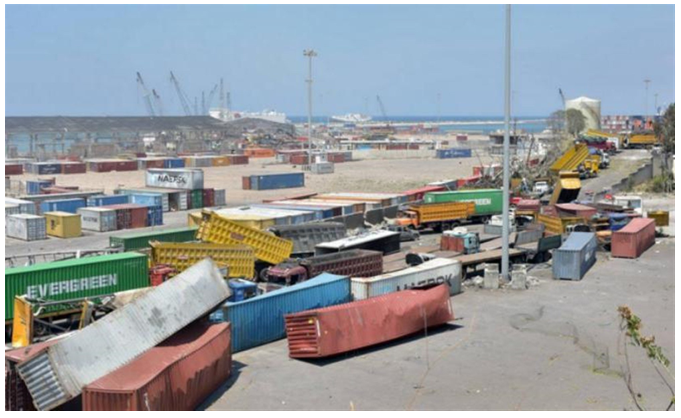The August 4 Beirut Blast, Report #5
A recent picture of the disheveled port of Beirut, September 23, 2020, photo credit: MTV
Report by Fouad Kazan
Brief Overview
Very recently, a survey was carried out by the Lebanese army in the devastated Beirut port and it was discovered 49 containers of flammable materials, such as acid and other materials used in the manufacture of paint, and raw materials. Consequently, the army held more than one meeting with representatives of the European Union, to conclude an agreement that the European Union would undertake the financing and management of the disposal of these inflammable materials. However, these materials have been present at the port since 10 years. As such, the question once again arises: Why was such a subject not talked about? Why did the authorities not attempt to solve it? Also, why do we, as a country, always need someone’s help in dealing with such issues? Shouldn’t the government be at least responsible for the safety of its own people?
Since the issue of dangerous material is continuously resurfacing every once in a while, one can conclude it was only a matter of time the massive Beirut blast would have occurred; there are so many ticking time bombs in Lebanon that we do not know about.
Humanitarian Aid
A picture of the destroyed buildings next to the blast site, photo credit: UNICEF2020/OCHA/New-York
Luckily, local and international NGOs continued throughout September to aid those that had been affected. The most notable and recent contribution done by INGO’s, is the Emergency Cash Grant program by the UNICEF to reach up to 80,000 children and vulnerable individuals affected by the Beirut Port explosion. It is a one-off emergency cash grant to all households that include children, members with a disability, members over 70 and female-headed households who experienced this explosion to cope and recover. Moreover, the UNFPA (United Nations Populations Fund) is currently distributing dignity kits to affected areas. Up until now, more than 29,000 dignity kits have been distributed to women and girls in the affected areas. Also, the UNFPA provided gender-based violence services to 1,029 Lebanese and Syrian refugees (761 women, 165 girls, 88 men, and 15 boys). The services included psychological first aid and case management. Different forms of psychosocial support (PSS) were also provided, including group non targeted PSS support and individual specialized psychosocial support to people in the affected neighborhoods through mobile teams and static centers.
Communication and Public Relations Department


